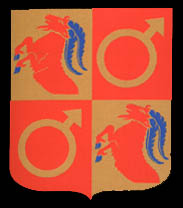Boxholm: Difference between revisions
Knorrepoes (talk | contribs) m (Text replacement - "|-↵|'''English''' " to ". |- |'''English''' ") Tags: Mobile edit Mobile web edit |
Knorrepoes (talk | contribs) m (Text replacement - "{{se}}'''" to "'''") |
||
| Line 1: | Line 1: | ||
'''BOXHOLM''' | |||
Province (Landskap): [[Östergötland]] <br> | Province (Landskap): [[Östergötland]] <br> | ||
Latest revision as of 08:44, 29 July 2024
BOXHOLM
Province (Landskap): Östergötland
County (Län): Östergötlands län
Additions: 1971 Folkunga (partly, 1952 Appuna, Hogstad, Hov, Kumla, Rinna, Väderstad), Södra Göstring (1952 Blåvik, Malexander, Åsbo)
| Swedish |
Sköld kvadrerad: 1. och 4. i fält av guld en halv upprest, röd bock med blå beväring; 2. och 3. i rött fält ett järnmärke av guld. |
| English | blazon wanted |
Origin/meaning
Boxholm grew as a village around the castle with the same name, founded in the 15th century. Boxholm received city status and arms 1940, the arms were reconfirmed and registered in 1971.
The arms are a combination of the symbol for iron, a symbol for mining and industry. The goat is a canting symbol taken from the arms of the founder of the castle, Arvid Gustafsson Stenbock, and is thus also canting for the city itself.
Contact and Support
Partners:
Your logo here ?
Contact us
© since 1995, Heraldry of the World, Ralf Hartemink 
Index of the siteLiterature: Nevëus and De Waern, 1992.










